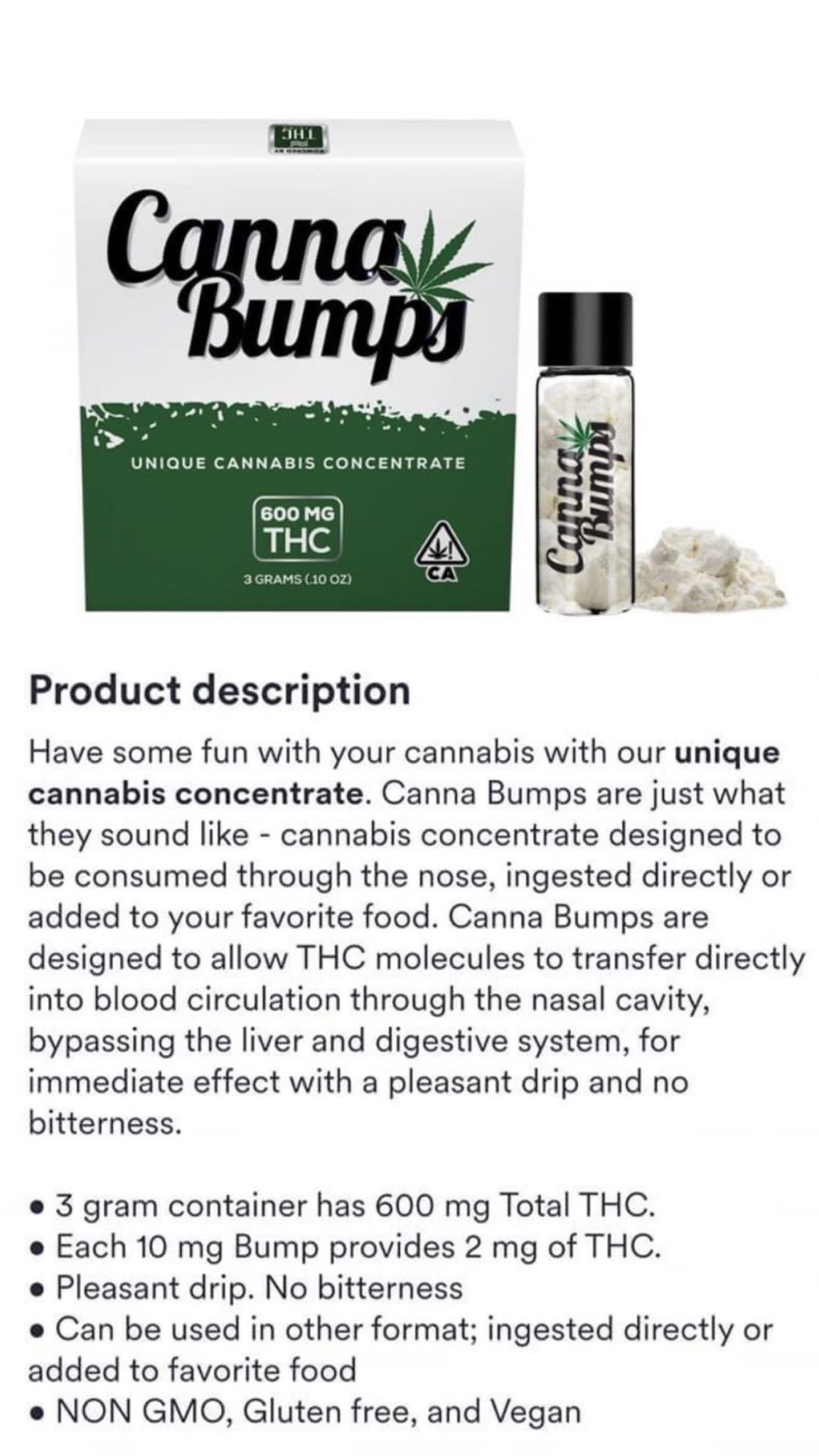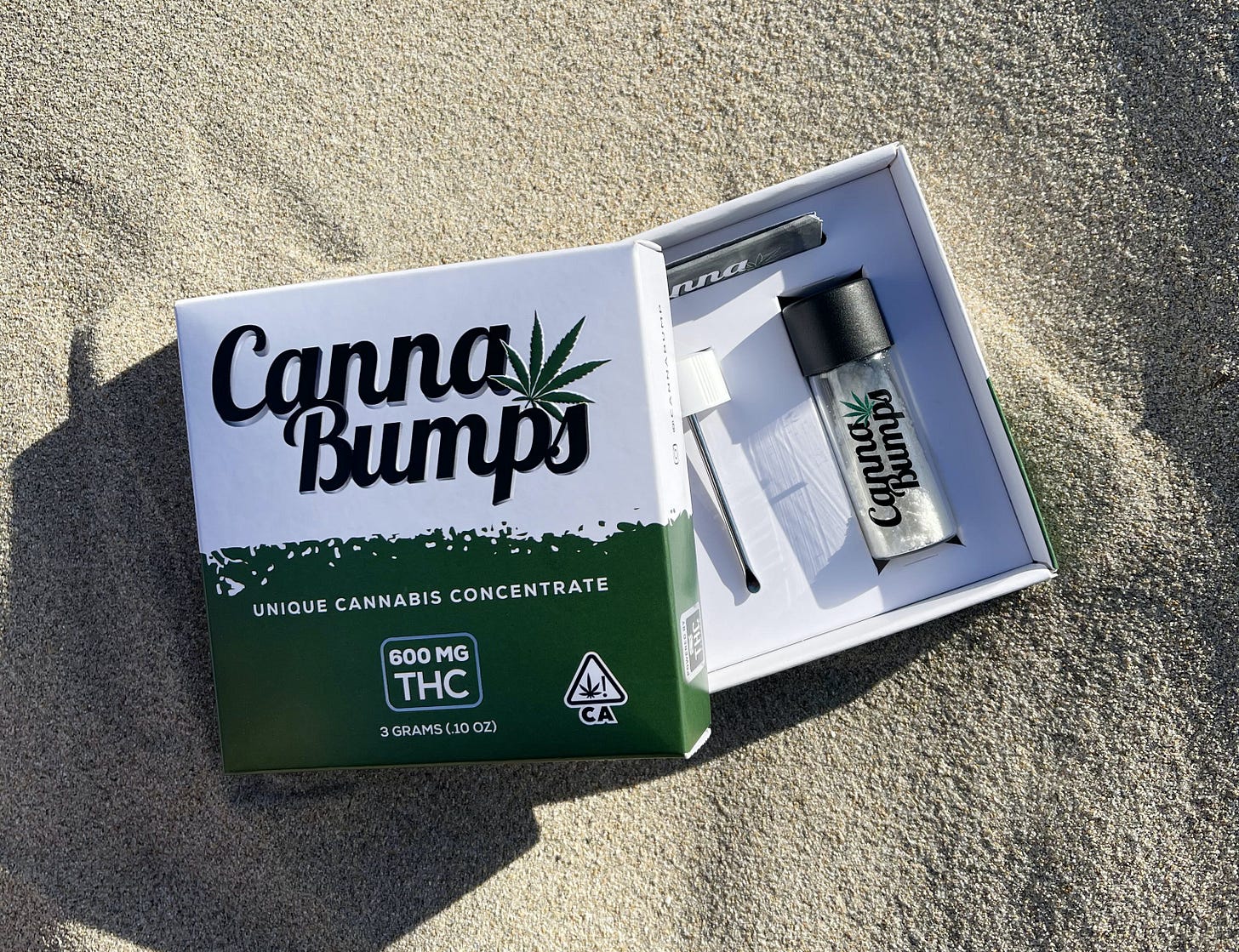MUCH ADO ABOUT SNORTING THC
What the Cannabumps controversy tells us about the cannabis industry's fault lines
This post has been unlocked from behind the paywall as a treat—for more spicy industry tea, smash the subscribe button and come giggle with me
As promised, today we’re plugging our noses and plunging into a stinky scandal that roiled the weed world this week involving the ethics of snorting THC powder lmao. More than just outrage porn, I’m serving this to ya’ll as a fascinating look into more complex debates over the technology, platforms, and cultural stigmas shaping the weed industry at this critical and confusing juncture—where national legalization seems imminent, but not yet a given. After breaking down the play-by-play of what happened, I’ll give you my take on what this scandal really means.
So please clear your sinuses, take a deep breath, and let’s jump in:
THE PRODUCT
A California-based legal weed brand called THC Living recently launched a product called Cannabumps—a cannabis concentrate powder with 600mg THC that is designed to be snorted up your nose, or, according to its marketing materials, sprinkled on your food (lol ok):
According to press photos that started circulating wildly online, it also came with a mini spoon and (what appears to be) a straw-like device for convenient snorting:
Cannabumps was listed on WeedMaps and Leafly, platforms that sell weed products in partnerships with cannabis brands and local dispensaries. Once it started to get flack, Cannabumps quickly disappeared from these sites, and could not be found on the brand’s own website and social media. Cannabumps vanished so mysteriously that Redditors started speculating that it was fake, but on Monday afternoon, a law firm representing THC Living released this statement to Leafly with an excuse that nobody really believed:
A few months ago, our client was approached by a third party that sought to utilize our client’s proprietary formulations in the creation of the Canna Bumps product. As soon as our client learned more about the product, it took the temperature of its customers and those in the industry to gauge how they felt about Canna Bumps. Because of its own concerns, those expressed by consumers, and the misgivings of those in the industry, our client made the decision to terminate any license granted to any third party that would use its proprietary information to produce or market a product like Canna Bumps.
THE WEED WORLD’S REACTION
As you can imagine, a lot of people in the weed industry did not fuck with Cannabumps.
Publicist Alice Moon called it “gross”:


Bruce Barcott, a senior editor for cannabis news site Leafly, blamed the brand for keeping marijuana illegal. He wrote:
“[Products like Cannabumps] help keep cannabis illegal for hundreds of millions of Americans, thereby propping up the prison state, aiding in the arrest of 450,000 Americans every year, and ruining the lives and lifelong prospect of untold numbers of adults. They hurt medical marijuana patients and cannabis consumers across the nation.”
Barcott questioned the legality of Cannabumps marketing itself as a 600mg edible, noting that the press release says it can be added to food, when California law limits edibles to 100mg of THC. (If Cannabumps is considered a concentrate, it can go up to 1000mg.)
Concentrate vs. edible classification aside, Barcott argued that Cannabumps does real harm by stoking fears in lawmakers and community leaders, especially in states where cannabis remains illegal and drug stigmatization is rife. “Stupid products like these live on forever in the prohibitionists’ propaganda deck,” he wrote.“Canna Bumps are now helping cops all across America turn innocent cannabis consumers into felons.”
Elsewhere on the weed internet, similar takes abounded, such as: “Cannabis Activists Didn't Fight To Legalize Weed For Cannabumps To Be A Thing”
Olivia Alexander, a Tik Tok weedfluencer who is the founder of cannabis brand Kush Queen, called for people to boycott THC Living in an Instagram post where she alleged that the company and its owner are “not what you call good people.”
I reached out to Olivia, and she told me over the phone:
“This is the most I’ve ever seen the cannabis industry agree on something. I don’t give a fuck, THC Living needs to be run out of this industry. I don’t think cocaine is a good drug. I don’t think people should go to jail for cocaine, but I don’t think we should be encouraging it either. I know this comes from a place of privilege, but the reality is I’ve been treated like a drug dealer and known a lot of people who have gone to jail and accused of money laundering. We have to de-stigmatize cannabis and amphetamines or opioids classes of drugs do not have benefits to me.”
Olivia also noted that she had R&D’ed all kinds of products for her own weed brand, including a snortable method using nanotechnology—the same process that THC Living used for Cannabumps. Nanotechnology essentially reduces the particle sizes of THC molecules to make them (allegedly) more bioavailable and water-soluble, allowing weed to be snorted via nasal spray, for example.
“This is insane science,” Olivia added. “The problem is that you have to cut it with so much filler like [food additive] Maltodextrin in order for it to actually work as a powder. So how much filler are people snorting?”
I also spoke to Tori Strains, a Boston-area journalist who previously worked on a YouTube show called “What’s In Your Weed” where she would lab test cannabis products. Tori called THC Living’s reputation into question, telling me that she tested a product labeled CBD Water by CBD Living (THC Living’s subsidiary company) and discovered that it contained no CBD at all.
Tori also noted that better cannabis research is needed at the government-level, particularly to combat the drug’s stigma:
“Cannabis is still Schedule 1, and scientists and researchers to not be able to study the drug freely is keeping cannabis in a chokehold. I don’t think it’s ok for us to say, this substance is fine but not that one, but on the same sort of tip, we’ve never seen cannabis have the severe medical effects from heroin, meth or crack. I would ask the government let the substance be studied so we can really figure out if it’s less harmful than these other drugs—we need the facts and research to be able to prove why it acts differently than other substances.”
Finally, in their recap of the scandal, cannabis news site Merry Jane dug up these tweets by Zane Bader, publicist and co-founder of the Georgia Cannabis Trade Association.

(Pharmacochauvinism is a form of drug elitism that ranks certain classes of drugs, like psychedelics, above others like cocaine.)

MY TAKE:
You guys won’t be surprised to hear that I think the outrage over Cannabumps is misguided, and has illuminated the tired elitism that still lingers within the cannabis community. This industry wants to position weed as far away from “bad” substances like cocaine in order to elevate its legitimacy in the eyes of lawmakers and other authority figures. A lot has to do with how, for the past few decades, the fight for cannabis legalization has hinged on pushing back against the propaganda that it is a gateway to harder drugs.
But the drug discourse has been shifting, particularly as cannabis legalization dovetailed with social justice movements like BLM last year. Increasingly the War on Drugs is recognized by Americans as subterfuge for institutional racism and akin to the new Jim Crow. “Under the drug war, police construct a veil of secrecy, freedom from legislative oversight, and latitude to set an agenda accountable to no one—a system that lies very far from presumed democratic institutional practices in the United States,” writes the ACLU.
Thanks to next-gen thought leaders like Carl Hart (aka the “Columbia heroin professor”), a small but increasingly vocal corner of the public are starting to question if the different shades in taboos between cannabis vs cocaine is more about racist stigma than science. Hart, as one of the few scientists who has been allowed to administer drugs like cannabis and heroin to human test subjects, believes that the lines between “hard” and “soft” drugs are overdrawn. “Neither heroin nor marijuana is inherently more evil than the other,” he wrote in his new book Drug Use for Grown-Ups.
I predict that as this line of thinking continues to permeate the mainstream, the sense of exceptionalism that is so status-quo in the weed and psychedelic fields will fade, as more people realize that stigmatizing drugs like cocaine (and heroin, for that matter) is no longer the “acceptable” stance. Instead, industry insider opinion will shift towards a “there are no ‘bad’ drugs” mentality—and so will their public virtue signaling.
Ultimately, you can’t shame a drug that no one has actually lab-tested or tried yet. So if someone wants to track down and send me a vial of Cannabumps, you already know I’m down.



I understand some of the pushback, but whoever came up with the idea for Cannabumps is an artist and a comedy genius.
Thanks for this thoughtful take on the issue.